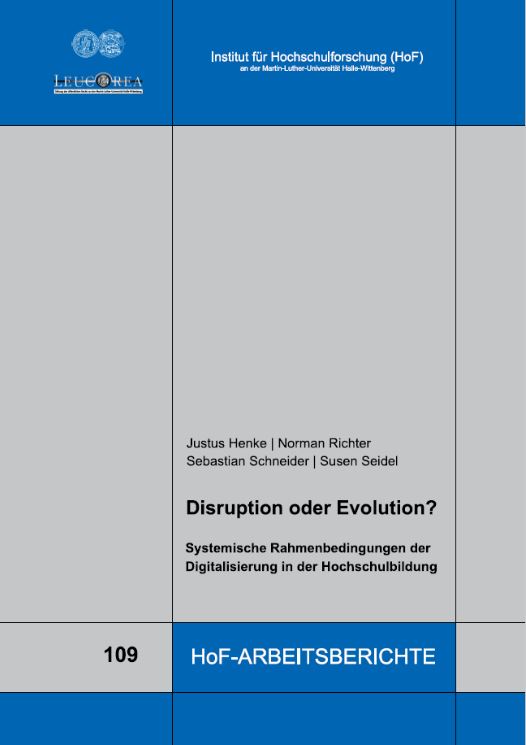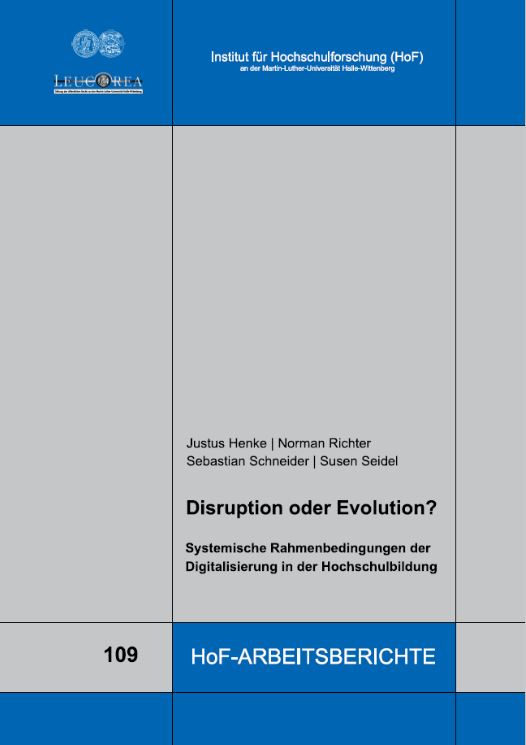Digitisation in higher education is also a matter of policy prioritisation. An article by Justus Henke
Digitisation in higher education is also a matter of policy prioritisation. An article by Justus Henke
04.09.19
“The disruptive effect of private online platforms is underestimated”. Based on his “Paper Disruption or Evolution? Systemic framework conditions of digitisation in higher education“, Justus Henke, research associate at the Halle-Wittenberg Institute for Higher Education Research (HoF), explains, to what extent political prioritisation influences digitisation in higher education.
This article was automatically translated using DeepL Translator. Please excuse any errors.![Good political framework conditions must be created. Photo: [https://unsplash.com/photos/T9CXBZLUvic Element5 Digital] Vote!](/sites/default/files/images/blog/element5-digital-T9CXBZLUvic-unsplash.jpg)
On the way to digital higher education
There is often talk of the digitisation of universities or the digitisation of higher education. There are two typical misunderstandings. Firstly, digitalisation is usually meant in higher education – i.e. not everything is digitalised – and secondly, digitalisation is often restricted to its technological prerequisites. Digitisation in higher education describes above all a change in the relationship between teachers and learners as a result of technological change. It is also about the digital redesign of organisational contexts to fulfil the educational mission of higher education institutions.
The role of politics in implementing this change should not be underestimated. At first glance, legal and financial issues in particular need to be clarified across higher education institutions. On the other hand, the impact of science policy also extends into the internal processes of higher education institutions. It was precisely this connection that I found particularly exciting when investigating the framework conditions of digitally supported higher education. While the debates often revolve around the concrete needs of higher education institutions, much less is said about the changes worth striving for in terms of science policy. In concrete terms, for example, what the university of the future should look like and what functions it should perform in the future education system with all the additional digital possibilities.![Which political priorities are important? Photo: [https://unsplash.com/photos/TW3dFH_4nEk Randy Colas] Which political priorities are important for the successful implementation of digitisation at universities?](/sites/default/files/images/blog/randy-colas-TW3dFH_4nEk-unsplash.jpg)
Are the universities sufficiently equipped for the digital transformation of teaching?
In our study, we have worked our way through an almost endless number of scientific, journalistic, empirical, conceptual and legal contributions to the digital transformation of higher education in a relatively short period of time. The aim was to systematically address the important policy-relevant aspects of digitization. We have identified numerous challenges that universities are currently facing. The general impression was that the universities are engaged in a variety of ways in modernising their teaching digitally. This ranges from technological innovations such as e-learning platforms to social processes such as the adaptation of teaching and learning cultures to the new formats.
However, it also turned out that universities cannot do this on their own. Important issues require state intervention, such as the clarification of data protection hurdles in learning analytics, nationwide licensing of online literature stocks of the major publishers (DEAL negotiations) or immense investments in new data infrastructures. At the same time, the state also bears responsibility for supporting and promoting internal process optimisations at universities, which in themselves would have to be designed independently by universities, but which require additional funds in the medium term.
Universities are therefore only conditionally equipped for the major transformation of education. The state – as we see it – must play an active and forward-looking role in this process. It should also be borne in mind that the education market is potentially threatened by disruptive developments from global platform economies just as the media sector, passenger transport and finance are. For forward-looking political action, the question arises as to how the public university system should be set up in ten or more years’ time.
Prioritisation – Politicians must know what is particularly important to them – and shape the framework conditions accordingly.
With a view to shaping the framework conditions for digitally supported higher education, we have considered the extent to which those currently diagnosed are relevant. We differentiate between the relevance for digitally supported higher education, the urgency of the need for adaptation and the possibilities for state participation. These criteria form the basis for the evaluation of particularly important subject areas. Here we have identified a total of ten key themes. In our view, science policy intervention in these areas is more urgent than elsewhere and makes particular sense.
Admittedly, such an assessment is primarily intended as an orientation aid to support political decision-making processes. Not every problem situation can be given the same attention, so digitisation is also a question of prioritisation. This also has a federal perspective, because we have examined issues of nationwide relevance. At the same time, science policy decisions are primarily to be taken by the Länder. It is therefore obvious that the digitisation agendas of the ministries of education and cultural affairs may well differ from one another. So there is a tension between state specific prioritisations and nationwide coordination needs. This applies, for example, to the question of whether a federal e-learning platform should be set up that would partially compete with the courses offered by the universities of the Länder or to what extent online teaching units in the Länder can be credited to the teaching load of professors.![Disruption or evolution - Which systemic framework conditions are needed? Photo: [https://unsplash.com/photos/aWDgqexSxA0 Johannes Plenio] Disruption or Evolution?](/sites/default/files/images/blog/johannes-plenio-aWDgqexSxA0-unsplash.jpg)
There’s still plenty to do.
Whether in the near future the university system will be overrun by commercial education platforms that offer nano degrees and badges for a fee, which are particularly in demand in industry, is more than questionable. In Germany in particular, with its free first degree program, universities do not have to face the greatest distress here. Nevertheless, I believe that there is currently a tendency to underestimate the disruptive effects of private online platforms. MOOCs and other private online formats would not have had the success once predicted, it is said. That may be true. Much, however, will depend on what young people on the threshold to university studies and working people with an interest in continuing education expect from universities in the future and to what extent there are attractive alternatives that may lead to faster success on the labour market.
From today’s perspective, it seems to me that the most likely scenario is not so much the disruption as the evolution of higher education. The value of direct social contacts as a prerequisite for deeper learning is widely recognised. Here, the university is developing into a place whose special quality feature is blended learning, i.e. the combination of classroom and online teaching.
Which path the universities should take against this background is also to be decided by science policy. In view of the current state of implementation of technological, organisational and social aspects of digitisation in higher education, there is still enough to do – for politicians and for universities.


 Felix Sühlmann-Faul
Felix Sühlmann-Faul 
 Dr. Hans Pongratz
Dr. Hans Pongratz 
 Dr. Klara Groß-Elixmann
Dr. Klara Groß-Elixmann 